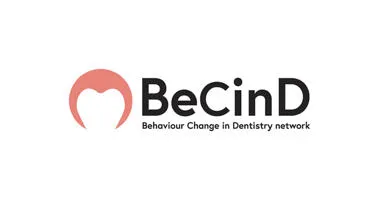
We are a collaborative team involved in research and service provision applying psychology to the dental setting. We are the world’s largest group of psychologists working in dentistry committed to providing evidence based, empirically tested solutions to oral health challenges.
Projects

Oral health related behaviour
We explore the role psychological theory can play in the understanding of health behaviours and the development of interventions to enhance oral health through behaviour change. Oral health is critically dependent upon the individual engaging in key behaviours such as tooth brushing and interdental cleaning. There is extensive evidence to suggest that theory-based interventions are superior to interventions not based on theory. We have reviewed and developed novel brief interventions for improving oral health related behaviours. This work formed the basis of our contribution to the development of the most recent guidelines of the European Federation of Periodontology.

Dental Fear and Anxiety
Dental phobia is the world’s most common simple phobia, affecting approximately 10% of adults and 10% of children worldwide. A further 38% of adults and children are moderately anxious, experiencing significant fear about attending for dental treatment, but not at the phobic level. We are interested in developing and testing interventions to enhance the experience of dental treatment amongst individuals who are moderately and severely anxious about dental treatment. As part of this we have developed the World’s first psychology led dedicated service for dental phobia. In order to disseminate this successful model, training materials and resources have been developed in both face-to-face and e-learning formats. The team have also collaborated with the University of Sheffield on the development of resources for young people who are moderately anxious about dental treatment – the ‘Your teeth, You are in Control’ materials. https://www.sheffield.ac.uk/dentalschool/research/childdentalanxiety

Early diagnosis of cancer
Our psycho-oncology research primarily focuses on early diagnosis of cancer. Our group have advanced the understanding of symptom appraisal and help-seeking behaviour for symptoms of cancer. This work has been used to develop and evaluate theory-based interventions to encourage timely healthcare use, including training for the dental team in how to communicate about oral cancer during routine consultations. In addition, we are involved in developing valid and reliable measurement tools for use in early diagnosis research in the UK and internationally. We are interested in the application of the Model of Pathways to Treatment to a range of cancer sites and other diseases where early diagnosis is key, in order to identify and target missed opportunities for early diagnosis.

Behaviour Change in Dentistry - the BeCinD Network
A network of researchers, clinicians and educators leading the behaviour change agenda in dentistry.
Publications
Activities

NHS Dental Psychology Service
We provide a specialist service that identifies, assesses and treats psychological difficulties that impact on dental care, treatment and outcomes.

Sociology and Psychology for the Dental Team: An Introduction to Key Topics
The role that the social and behavioural sciences play in the daily practice of dentistry is now an essential part of all dentistry training, but it can often seem distant from the reality of daily clinical practice. Dentists often ask: what is sociology? Why do I need to know about psychology? This textbook by Sasha Scambler, Suzanne Scott, Koula Asimakopoulou answers these important questions and shows how the social and behavioural sciences can inform the practice of dentistry and allied healthcare services in the twenty-first century. It provides a comprehensive, accessible introduction to sociology and psychology for students and members of the dental team. Throughout, the links between sociology and psychology and everyday practice are emphasized and explained and theoretical concepts are put into the context of everyday clinical work. This book is an indispensable teaching aid within dental health education, and other allied health and social care disciplines.

E-learning course: Cognitive Behavioural Techniques for the Management of Dental Fear
This online course has been designed for general dental practitioners, specialist dental practitioners, all other dental care professionals, consultants in dental public health, psychologists, nurses and other professionals treating or planning to treat dental fear. Through practice sessions, case studies and problem-centred learning, participants will develop their skills in assessing anxious patients and developing therapy plans, including graded exposure and cognitive interventions.
Projects

Oral health related behaviour
We explore the role psychological theory can play in the understanding of health behaviours and the development of interventions to enhance oral health through behaviour change. Oral health is critically dependent upon the individual engaging in key behaviours such as tooth brushing and interdental cleaning. There is extensive evidence to suggest that theory-based interventions are superior to interventions not based on theory. We have reviewed and developed novel brief interventions for improving oral health related behaviours. This work formed the basis of our contribution to the development of the most recent guidelines of the European Federation of Periodontology.

Dental Fear and Anxiety
Dental phobia is the world’s most common simple phobia, affecting approximately 10% of adults and 10% of children worldwide. A further 38% of adults and children are moderately anxious, experiencing significant fear about attending for dental treatment, but not at the phobic level. We are interested in developing and testing interventions to enhance the experience of dental treatment amongst individuals who are moderately and severely anxious about dental treatment. As part of this we have developed the World’s first psychology led dedicated service for dental phobia. In order to disseminate this successful model, training materials and resources have been developed in both face-to-face and e-learning formats. The team have also collaborated with the University of Sheffield on the development of resources for young people who are moderately anxious about dental treatment – the ‘Your teeth, You are in Control’ materials. https://www.sheffield.ac.uk/dentalschool/research/childdentalanxiety

Early diagnosis of cancer
Our psycho-oncology research primarily focuses on early diagnosis of cancer. Our group have advanced the understanding of symptom appraisal and help-seeking behaviour for symptoms of cancer. This work has been used to develop and evaluate theory-based interventions to encourage timely healthcare use, including training for the dental team in how to communicate about oral cancer during routine consultations. In addition, we are involved in developing valid and reliable measurement tools for use in early diagnosis research in the UK and internationally. We are interested in the application of the Model of Pathways to Treatment to a range of cancer sites and other diseases where early diagnosis is key, in order to identify and target missed opportunities for early diagnosis.

Behaviour Change in Dentistry - the BeCinD Network
A network of researchers, clinicians and educators leading the behaviour change agenda in dentistry.
Publications
Activities

NHS Dental Psychology Service
We provide a specialist service that identifies, assesses and treats psychological difficulties that impact on dental care, treatment and outcomes.

Sociology and Psychology for the Dental Team: An Introduction to Key Topics
The role that the social and behavioural sciences play in the daily practice of dentistry is now an essential part of all dentistry training, but it can often seem distant from the reality of daily clinical practice. Dentists often ask: what is sociology? Why do I need to know about psychology? This textbook by Sasha Scambler, Suzanne Scott, Koula Asimakopoulou answers these important questions and shows how the social and behavioural sciences can inform the practice of dentistry and allied healthcare services in the twenty-first century. It provides a comprehensive, accessible introduction to sociology and psychology for students and members of the dental team. Throughout, the links between sociology and psychology and everyday practice are emphasized and explained and theoretical concepts are put into the context of everyday clinical work. This book is an indispensable teaching aid within dental health education, and other allied health and social care disciplines.

E-learning course: Cognitive Behavioural Techniques for the Management of Dental Fear
This online course has been designed for general dental practitioners, specialist dental practitioners, all other dental care professionals, consultants in dental public health, psychologists, nurses and other professionals treating or planning to treat dental fear. Through practice sessions, case studies and problem-centred learning, participants will develop their skills in assessing anxious patients and developing therapy plans, including graded exposure and cognitive interventions.
Our Partners

University of Cape Town
Eastman Dental Institute
Trinity College Dublin
Alliance for a Cavity Free Future
University of Surrey
Loughborough University
University of Cambridge
Group lead
Contact us
Professor Tim Newton
Professor of Psychology as Applied to Dentistry
Guy's Tower Wing
Guy's Hospital








